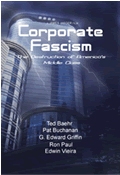By
Investigating Journalist Jon Rappoport
January 18, 2011
NewsWithViews.com
In the age of political correctness, it has become normal to ask what comment, word, phrase, film, TV show, insult, or stray remark has offended a “victim.” Then, without pause, blame is placed on that offensive communication and the person behind it.
This is important, because with just a slight adjustment, it is now acceptable to ask what has motivated a potential killer to cross the line and kill—so we can engage in the same kind of blame.
I'm talking about Loughner, of course, and the Arizona shooting.
The latest discovery is that he was obsessed with watching the film, Zeitgeist.
People can therefore attack the film as “the psychological trigger.”
This is pure nonsense.
It is deranged nonsense, and it leads to calls to limit free speech.
If we had to eliminate everything that could negatively influence a criminal, we'd have nothing left. The fact of the matter is, all criminals seek to rationalize their actions with lies, and there is no length they won't go to, in order to make what they do excusable.
As usual, however, the forces of political correctness want to accuse words and images for the actions people take. This is a convenient way to wipe personal responsibility off the map.
Those who are in love with politically correct speech pretend to believe that a kinder, gentler society can be produced by curbing language—and they want to program this “abstinence” into children at a young age. They are, underneath it all, advocates of operant conditioning. They refuse to acknowledge that accountability for one's actions is the true way of educating the young; it's too harsh, too stark, too real. It doesn't involve systematizing life in an effort to regulate it—so they're against it.
Personal accountability also tends to cut down on the number of available victims, and this social development would terrify the PC people. Without a sufficient supply of victims, real or imagined, they would be out of business. In their world view, it's all about oppressors and the oppressed. That formula must endure.
Politicians and media hype artists have, in the case of Loughner, attempted to paint a picture of politically incorrect “uncivil discourse” spreading over the land like a plague, and that gestalt, they say, trapped Loughner in its web, and he was unable to escape, given his delicate mental condition.
This is amateur hour for idiots. Only on major television networks, or in the halls of academia, could it stand a chance of playing to the crowd. In any private venue, it would be laughed off in five seconds.
Oh, I forgot to mention one other place where such heavily perfumed analysis would fly: the chambers of government.
Political correctness is based on a vague generality of inflicted harm. Hustlers of every stripe use it to defend the groups they represent, for whom they seek recompense.
So now we have come to murder and a murderer, and the need to say he had no choice, he was caught up in a crossfire of uncivil national verbiage which forced him to go on the attack. His victims are “all of us.” Or something.
The political left revels in such tortured analysis. When any sane person first encounters this, he thinks it's a sick joke. They couldn't be serious. They couldn't be making this kind of cause-and-effect link. But they are.
It's how they make their bones and their living among their own kind. They think they're being sophisticated. Actually, they sound like children who've been let loose on an elementary sociology text.
For the past 50 years, and as we speak, all over America, in colleges, students are being told they are victims. They're being introduced to this revelation. It's stunning because it's so empty. What to do? In the end, many kids buy it, because it's acceptable to do so. They then begin to weave tales and stories that explain exactly how they have become oppressed. This is what they grow up with.
And then, as adults, they look for ways in which criminals “have been forced to do what they do.”
In the case of Loughner, because liberal media outlets have found the story line, the thread is passed on: he was mentally unstable, and the bellicose nature of political talk netted him and delivered him over to his murderous outburst.
If media outlets want to know why their ratings are disappearing down the toilet, this is a clue.
The majority of American people have a much firmer grasp on reality. Despite every effort to turn their heads, they continue to believe that choice, freedom, and accountability are the fundamentals.
The most basic politically correct idea is the one recently expressed in the White House's tasteless and offensive slogan for the “memorial event” in Tucson: TOGETHER WE THRIVE.
What does this even mean? For example, in a time of severe economic hardship, how will “together” help people find jobs?
It doesn't matter. The point is, through some wizardry, the sense of unity will pull us all through.
“Together,” you see, is the vague generality that means Collectivism to liberals pretending to be liberals when they're really socialists. It means, when you strip it down, that one guiding force—the government—has the solutions to our problems. Who else, except government, could “together” be pointing to? Are we supposed to believe, literally, that all of us will gather in one place and decide what to do? Three hundred million people?
Somebody, I can't think who, had an answer for that. Oh yes, it was Lenin. He was a promiser of paradise. He really was. He instituted a dictatorship that was supposed to be of, for, and by the Proletariat. But it was actually a few men controlling everyone else. That was “together.”
These days, the language is gentler, but the trend is moving in the same direction.
“Together,” given this push and spin, is the ultimate in politically correct language. It sounds nice, it feels good, it feels like family, but it isn't.
As for the other key word in the slogan—thrive—when was the last time you heard that sentiment expressed at a memorial for the dead?
“Our sister is gone, but we will thrive.”
Are you kidding?
| Subscribe to the NewsWithViews Daily News Alerts! |
No, “thrive” was a naked attempt to refer to our lack of thriving these days...the economic condition of the country. It was slipped in to promote the sense that recovery is on the way, if we will only support the White House and its programs. Together.
Stunning.
At a memorial for the dead.
The only thing missing was a long counter, so people could register to vote as Democrats.
Again, never let a crisis go to waste.
� 2011 Jon Rappoport - All Rights Reserved
Sign Up For Free E-Mail Alerts
Jon Rappoport has worked as an investigative reporter for 30 years. Nominated for a Pulitzer Prize early in his career, Jon has published articles on medical fraud, politics, alternative health, and sports in LA Weekly, CBS Healthwatch, Spin, Stern, and other magazines and newspapers in the US and Europe.
He is the is author of several books, including The Secret Behind Secret Societies and The Magic Agent (a novel).
Jon is the author of a new course for home schoolers, LOGIC AND ANALYSIS.
E-Mail: qjrconsulting@gmail.com
Web site, www.nomorefakenews.com
Web site, www.insolutions.info














 Share
This Article
Share
This Article







